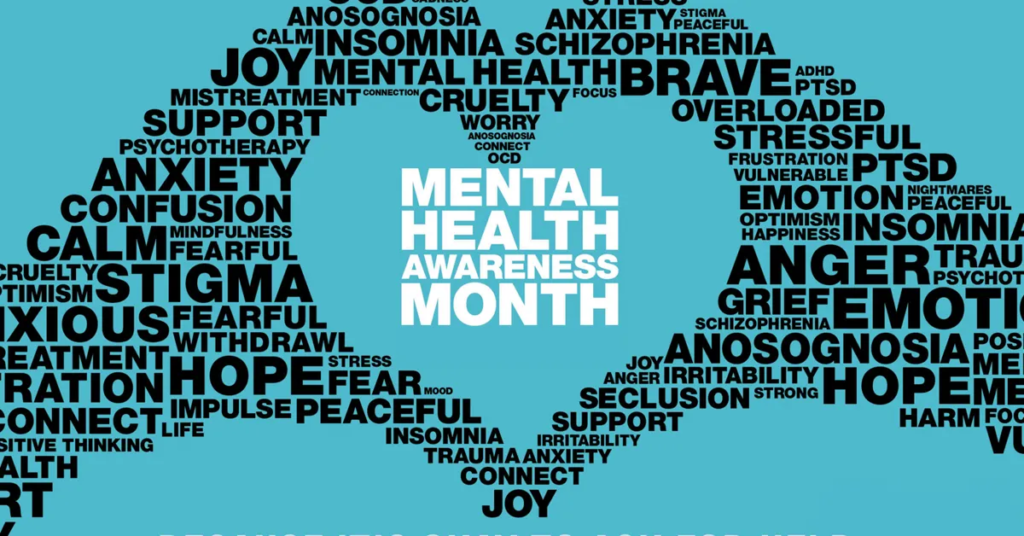May 2025 marks National Mental Health Awareness Month in the United States, and this year’s focus is more urgent than ever. As the nation continues to navigate the long-term effects of the pandemic, rising social pressures, and a rapidly evolving digital landscape, mental health challenges have become increasingly visible. This month serves as a powerful reminder that mental wellness is just as important as physical health — and it’s time for America to prioritize both.
The History Behind National Mental Health Awareness Month
Mental Health Awareness Month was first established in 1949 by Mental Health America (MHA). Since then, every May has served as a dedicated time to increase awareness about mental health issues, break the stigma surrounding mental illnesses, and encourage individuals to seek help.

This annual campaign has grown in strength and scale, with public events, online campaigns, and community programs taking place nationwide.
External Source
Learn more about the history of Mental Health Awareness Month from Mental Health America
The 2025 Theme: “Your Mind Matters”
This year’s theme, “Your Mind Matters,” emphasizes the importance of self-care, community support, and access to professional help. The message is clear — mental health should not be treated as a luxury or an afterthought. Everyone deserves access to care, tools, and support to maintain emotional and psychological well-being.

According to a report by the National Alliance on Mental Illness (NAMI), over 1 in 5 adults in the U.S. experience mental illness each year, and nearly 50% of adolescents report struggling with mental health concerns at some point.
Mental Health in 2025: What Has Changed?
Several changes have shaped the mental health conversation in 2025:
1. Post-Pandemic Mental Health Recovery
The aftershocks of COVID-19 still impact millions. Increased isolation, loss, and economic hardship have led to a spike in anxiety, depression, and PTSD cases. However, awareness and accessibility to teletherapy and online counseling services have grown rapidly, offering support to underserved and rural communities.
2. Mental Health in Schools and Workplaces
Institutions are now more proactive. Schools are hiring licensed counselors, adding wellness programs, and conducting regular mental health check-ins. Employers are adopting employee mental health policies, encouraging flexible work hours, and offering access to wellness apps.
3. Youth and Social Media Influence
Teenagers and young adults are increasingly facing digital fatigue. Platforms like Instagram and TikTok have been linked to lower self-esteem and anxiety. This year, advocacy groups are urging platforms to include mental health check-ins and limit exposure to toxic content.
Breaking the Stigma: Real Stories, Real Change
One of the most effective ways to reduce stigma is through storytelling. This year, campaigns are spotlighting real-life stories of resilience from people across all walks of life — veterans, students, healthcare workers, and parents — who openly share their mental health journeys.

Organizations such as The Trevor Project and BetterHelp are sharing powerful videos, podcasts, and blog posts to help normalize conversations around therapy, medication, and emotional well-being.
How You Can Participate in Mental Health Awareness Month 2025
There are many simple ways individuals, families, and communities can get involved this May:
1. Wear Green
Green is the official color of mental health awareness. Wear green to show your support and spark conversations.
2. Host or Attend a Mental Health Event
Attend webinars, support groups, or fundraising events in your area. Many local chapters of NAMI and MHA are hosting free mental wellness workshops and mindfulness sessions.
3. Share Your Story Online
Use hashtags like #MentalHealthMonth2025 and #YourMindMatters to spread awareness on social media.
4. Donate to Mental Health Charities
Support organizations working to improve access to mental health services.
5. Check on Loved Ones
Sometimes, just a message or call can make a difference. Let friends and family know you’re there for them.
External Source
Find an event near you with Mental Health America’s event calendar
What Experts Are Saying
Mental health professionals emphasize that while awareness months are important, mental health should be a daily priority.
“Mental Health Awareness Month helps jumpstart the conversation, but the work must continue all year round,” says Dr. Alicia Graham, a clinical psychologist in New York. “Early intervention, education, and accessible services are key to a healthier society.”
Government and Policy Updates
In 2025, the federal government announced increased funding for mental health initiatives, with $2 billion dedicated to improving access to therapy, creating suicide prevention programs, and training more mental health professionals. Several states, including California and New York, are also piloting universal mental health screening in public schools.
Also visit
Read about the federal mental health funding announcement
Final Thoughts: Keep the Conversation Going
As we honor National Mental Health Awareness Month in May 2025, let’s remember that taking care of our minds is not a trend — it’s a lifelong commitment. Whether you’re someone struggling silently or an advocate for mental wellness, your voice and actions matter.
Together, by staying informed and supporting one another, we can build a healthier, more compassionate world.
Also Read – Study Uncovers Secret to Living 10+ Years Longer in America





